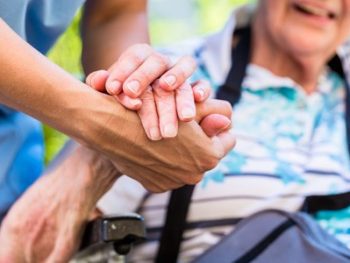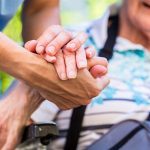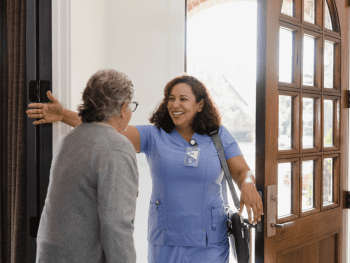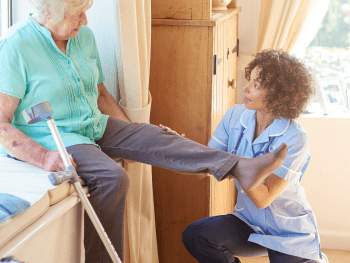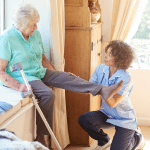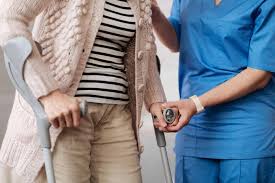
Pemi-Baker Community Health (PBCH) is excited to announce that the Waterville Valley charity event, “Battle of the Sexes Tennis Tournament” will be held on the outdoor, clay courts on Sunday, September 19th 2021. Doubles men’s teams will compete against doubles women’s teams in hour long battles on the court as well as competition for overall moneys raised for PBCH’s Palliative & Hospice Care.
The generosity of our players, sponsors, and donors has raised $30,000 over the past six years for PBCH and hopes are high for bragging rights this year. You can join in the fun by registering your doubles team; players are participating from all over the state. In past years, Pirates, Roaring Twenties Flappers, Cowboys and Pink Diva costumes have added to the fun and given players point advantages. Players can also ‘buy’ mulligans / serves during play which of course adds to the proceeds and fun.
There are many other ways to get involved if you don’t want to battle it out on the tennis court. An auction site has been set up to buy raffle tickets for wine baskets, photography/artwork and more. You can also help your favorite team win the ‘Moneys Raised’ competition by donating on the auction site towards your favorite team: ‘Men’ or ‘Women’. www.32auctions.com/Battle2021
If you would rather be a spectator watching the shenanigans and banter, we encourage you to join us courtside on the 19th. Teams will be competing from 2-5pm and prizes will be given out at the after-party at the Wild Coyote Grill located in the White Mountain Athletic Club. Raffle tickets can also be bought at Pemi-Baker Community Health, courtside during the competitions and at the after-party. Many thanks to our sponsors Waterville Valley Realty and Roper Real Estate!
For more information about how you can get involved, please look on our events page.
 With over 50 years of experience, serving clients from 28 towns in central and northern New Hampshire, Pemi-Baker Community Health is committed to creating healthier communities. Services include at-home healthcare (VNA), hospice and palliative care, on-site physical and occupational therapy and aquatic therapy in their 90-degree therapy pool. Providing compassionate care with experienced staff who are trained, certified professionals in the business because of their hearts. In your time of need, we’re right where you need us.
With over 50 years of experience, serving clients from 28 towns in central and northern New Hampshire, Pemi-Baker Community Health is committed to creating healthier communities. Services include at-home healthcare (VNA), hospice and palliative care, on-site physical and occupational therapy and aquatic therapy in their 90-degree therapy pool. Providing compassionate care with experienced staff who are trained, certified professionals in the business because of their hearts. In your time of need, we’re right where you need us.
PBCH is located at 101 Boulder Point Drive, Plymouth, NH. To contact us please call: 603-536-2232 or email: info@pbhha.org Like our Facebook Page: @PBCH4
~written by Anna Swanson



 Through all this, we see Alice’s progressive deterioration through the loss of her teaching career, her advancing inability to recognize those closest to her, disorientation within her own home, an interrupted suicide attempt, her husband’s decision to relocate in favor of his professional betterment, and the loving self-sacrifice of Lydia to care for her. Despite the wasting away of the many qualities that made her the person she had been, she remains “still Alice” in a brief moment of recall when she is able to identify the importance of love.
Through all this, we see Alice’s progressive deterioration through the loss of her teaching career, her advancing inability to recognize those closest to her, disorientation within her own home, an interrupted suicide attempt, her husband’s decision to relocate in favor of his professional betterment, and the loving self-sacrifice of Lydia to care for her. Despite the wasting away of the many qualities that made her the person she had been, she remains “still Alice” in a brief moment of recall when she is able to identify the importance of love. “The Father” features Olivia Colman (currently seen as Queen Elizabeth II in Seasons Three and Four of the series “The Crown”). For her portrayal as Anne, Anthony’s daughter, Colman was nominated for the Academy Award for Best Supporting Actress.
“The Father” features Olivia Colman (currently seen as Queen Elizabeth II in Seasons Three and Four of the series “The Crown”). For her portrayal as Anne, Anthony’s daughter, Colman was nominated for the Academy Award for Best Supporting Actress. What to do about emerging potentially aggressive behaviors? How to live with the strain imposed on other intimate relationships? When does one arrive at the point of surrendering caregiving to a corps of providers in a setting that may better manage the patient’s needs? Hopkins’ masterful performance in this intense drama can be seen on You Tube, Amazon Prime, and Vudu.
What to do about emerging potentially aggressive behaviors? How to live with the strain imposed on other intimate relationships? When does one arrive at the point of surrendering caregiving to a corps of providers in a setting that may better manage the patient’s needs? Hopkins’ masterful performance in this intense drama can be seen on You Tube, Amazon Prime, and Vudu.





 We will be making use of GRIEF ONE DAY AT A TIME by Alan D. Wolfelt, PhD. Dr. Wolfelt is a noted grief educator, having written several books about healing personal grief. His expertise derives from his compassionate interaction and caring service with mourners, listening to and reflecting on their responses to loss. He is the Founding Director of The Center for Loss and Life Transition in Fort Collins, Colorado. Although our group is offered for support rather than clinical intervention, the use of reading materials for the purpose of self-care and personal growth and healing is sometimes called bibliotherapy. The books will be made available at our first session of the group. We ask, if possible, for group members to make a donation toward defraying the cost of purchasing the books which group members will be able to keep for themselves. No one will be turned away if they are unable to make a donation.
We will be making use of GRIEF ONE DAY AT A TIME by Alan D. Wolfelt, PhD. Dr. Wolfelt is a noted grief educator, having written several books about healing personal grief. His expertise derives from his compassionate interaction and caring service with mourners, listening to and reflecting on their responses to loss. He is the Founding Director of The Center for Loss and Life Transition in Fort Collins, Colorado. Although our group is offered for support rather than clinical intervention, the use of reading materials for the purpose of self-care and personal growth and healing is sometimes called bibliotherapy. The books will be made available at our first session of the group. We ask, if possible, for group members to make a donation toward defraying the cost of purchasing the books which group members will be able to keep for themselves. No one will be turned away if they are unable to make a donation. ou and your family members to ask questions and relay concerns. Their focus is on relieving the symptoms and stress of your illness. The goal is to improve quality of life for both the patient and the family. This is done by coordinating the patient’s care as well as providing
ou and your family members to ask questions and relay concerns. Their focus is on relieving the symptoms and stress of your illness. The goal is to improve quality of life for both the patient and the family. This is done by coordinating the patient’s care as well as providing 

